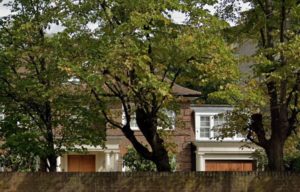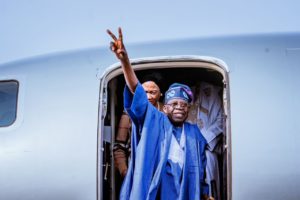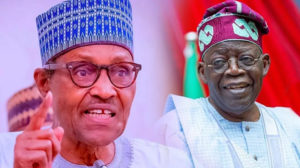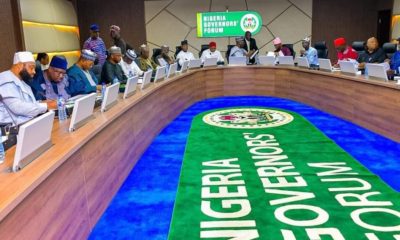Politics
Nigeria’s President-elect’s Family Tied To Controversial London Mansion Purchase

A report by Bloomberg released on Tuesday claims that company documents have revealed, that an offshore owner of an $11 million London mansion, which was targeted for confiscation as part of an investigation into one of Nigeria’s biggest corruption scandals, is controlled by the son of the country’s President-elect, Bola Tinubu.
The documents indicate that a firm owned by Tinubu’s son purchased the property in 2017. However, there is no evidence to suggest that Tinubu himself was involved in the acquisition.
President Muhammadu Buhari had visited the London property in August 2021, almost four years after the purchase was made.
Tinubu has long faced questions regarding the source of his family’s wealth, including during the recent election campaign when he and his representatives were repeatedly questioned by local and international media.
Tinubu has consistently maintained that his wealth was acquired through his inheritance of real estate, sound investments, and his previous employment as an accountant at Deloitte LLP and as an executive at the Nigerian subsidiary of Mobil Oil in the 1980s and early 1990s.
He even cited Warren Buffett as a role model for his financial success in an interview with the BBC leading up to the election.
However, recently uncovered corporate documents reveal that Tinubu’s 37-year-old son, Oluwaseyi, is the primary shareholder of Aranda Overseas Corp., an offshore company that paid £9 million ($10.8 million) to Deutsche Bank for the purchase of an extravagant three-story residence in the posh St. John’s Wood neighborhood of north London.
The property features amenities such as an eight-car driveway, electric gates, two gardens, and a gym. It is situated in an area popular among American bankers. While there is no evidence that Tinubu was involved in the acquisition of the property, the revelation is likely to fuel further questions about the source of the family’s wealth.
Despite attempts to reach out for comment, both Bola Tinubu’s spokesman and his son Oluwaseyi Tinubu have not responded to emails, phone calls, and text messages. A British lawyer listed as Aranda’s agent in the UK has also declined to comment, citing confidentiality rules.
During the time of the purchase, Nigeria’s government was pursuing the former owner of the property, Kolawole Aluko, who was accused of fleeing while owing the country a debt of over $1.5 billion in oil-trading. The state was also trying to seize the luxurious property and other assets it suspected Aluko had obtained through illicit means.
Aluko has denied all accusations of wrongdoing and claims that a court judgment earlier this year clearing his former business partner has cleared his name. However, the ruling is being contested by Nigeria’s anti-graft agency.
Bola Tinubu, aged 71, emerged victorious in the February election as the candidate of the ruling All Progressives Congress and is expected to succeed his political ally, President Buhari, on May 29. Tinubu played a pivotal role as a power broker in the opposition party merger that helped bring Buhari into power in 2015.
Despite President Buhari’s campaign promise to combat corruption, Nigeria’s ranking in Transparency International’s Corruption Perceptions Index has declined over the past eight years.
Bola Tinubu, who previously served as the governor of Lagos state, has faced persistent accusations of corruption and violations of the law, which he has denied.
In 1993, he relinquished $460,000 to settle a lawsuit in Chicago after US federal authorities alleged that bank accounts in his name contained the profits of heroin trafficking. Tinubu’s legal team has stated that he was never charged in connection with the case.
In August 2021, while Bola Tinubu was staying at the 7,000-square foot London home, he received a visit from President Buhari, as reported by the Lagos-based newspaper Premium Times.
According to documents obtained from the Pandora Papers leak of offshore companies data, shareholders and directors of Aranda, which purchased the London property, were Adegboyega Oyetola, the former governor of Osun state, and Elusanmi Eludoyin, the head of a Nigerian property group, from its establishment 24 years ago until at least 2010.
However, requests for comment from Oyetola’s spokesman and Eludoyin went unanswered.
The Newly-filed documents in response to UK anti-money laundering rules and viewed by Bloomberg this year revealed that Tinubu’s son, an advertising entrepreneur who played a prominent role in his father’s presidential campaign, has controlled Aranda, registered in the British Virgin Islands, since June 2011.
The company was registered as an overseas entity in the UK on January 20th.
During Buhari’s first term, his administration launched legal proceedings against Diezani Alison-Madueke, who was the oil minister for five years until 2015.
The government also took action against two businessmen, Kolawole Aluko and Olajide Omokore, who secured lucrative contracts during her tenure.
The US government filed a lawsuit for forfeiture in Texas in 2017, accusing Aluko and Omokore of bribing the minister and failing to pay the state-owned energy company for most of the crude oil they received.
Alison-Madueke, who is based in London, has denied the allegations and is challenging multiple forfeiture orders issued by Nigerian courts. She has also accused the anti-corruption agency of preventing her from defending herself in criminal proceedings.
In June 2016, a federal judge in Abuja, the Nigerian capital, granted a request by the Economic and Financial Crimes Commission to seize over a dozen properties owned by Aluko, both in Nigeria and abroad, including the St. John’s Wood house.
The forfeiture order was still in effect when Tinubu’s son acquired the property out of receivership 16 months later.
According to court filings, the forfeiture order granted in June 2016 against Kolawole Aluko’s assets, including the St. John’s Wood property, was made on an interim basis and was pending the conclusion of an ongoing investigation into Aluko, as of at least the end of 2018.
Aluko’s lawyer, Tokunbo Jaiye-Agoro, declined to comment on the forfeiture case, citing that it is still “sub-judice.”
In late 2016, Deutsche Bank foreclosed on the house owned by Aluko and appointed receivers to sell it. However, it is not clear whether the Nigerian government was aware of the lender’s takeover of the house as it pursued the seizure process.
According to court filings, Aluko had taken out loans using other properties as collateral. The Economic and Financial Crimes Commission (EFCC) alleged that the buildings were purchased with the proceeds of crime, and that Aluko had fled the country to avoid answering the fraud allegations against him.
In February, a Nigerian court acquitted Olajide Omokore of charges related to the same allegations. However, the EFCC, which accused Omokore of defrauding the state energy firm of $1.6 billion, has said it will appeal.
Aluko was removed from the indictment because he was not in the country at the time, and his current whereabouts are unknown.
Meanwhile, Omokore’s lawyer has objected to any continued linking of his client’s name to corrupt practices.
The Nigerian government officials, including Buhari’s spokesman, the Attorney General, the Nigerian National Petroleum Co. Ltd., and the EFCC, did not respond to requests for comment.
In October 2017, Tinubu’s son’s company, Aranda, bought one of the properties that was being targeted by the Nigerian government in its pursuit of Aluko and his assets.
The property in question is still owned by Aranda, and according to UK land records, there is currently no mortgage registered to it.
Aranda did not purchase the house directly from Aluko but from a UK unit of Deutsche Bank AG. The bank had foreclosed on the property and appointed receivers to sell it a year earlier.
Aluko had acquired the mansion via a BVI company in 2013 and paid £11.95 million, according to Premium Times. Deutsche Bank declined to comment on the matter.
It’s worth noting that the property in question is not the only luxury asset that Aluko has been linked to. In 2017, the US Department of Justice accused him and Omokore of using illicit funds to buy a $50 million penthouse in New York, a $80 million yacht, and several other assets.
According to Aluko’s lawyer, Jaiye-Agoro, his client has no knowledge of Aranda or the individuals behind the company and was not aware of the sale of the property, as Deutsche Bank had foreclosed on the house.
It is unclear whether the Nigerian authorities had requested the UK’s National Crime Agency to freeze the property.
The UK Home Office declined to comment on the matter. In March 2021, the US Justice Department announced that it had seized assets worth over $53 million, including a 65-meter superyacht and luxury homes in California and New York, purchased by Aluko for more than $160 million using what it considers to be the proceeds of corruption.
Politics
Leadership Newspaper Backs Adeleke For Second Tenure, Names Him ‘Gov Of The Year’

It was a plethora of pleasantries in Osogbo on Thursday, when Osun State Governor, Senator Ademola Adeleke was named 2024 Governor of the year and endorsed for second tenure in office by the top management of the Leadership Newspaper.
The newspaper’s team was on a courtesy call on Gov Adeleke, Biztellers reports.
Receiving them at the Government House, Gov Adeleke noted that his administration had reduced the infra deficit by over 40 percent.
He added that his administration had also bridged access to primary health care, with an ambition to expand health access at medium and tertiary levels.
He said, “Osun State is constantly getting recognitions for what outsiders and even opposition members regard as our commendable performance.
“In the last one year, our government has been conferred with several awards across the sectors. Aside from reputable newspapers like the leadership stable, we have received accolades from several federal agencies and non-governmental bodies. The consensus from those reviewing our performance and service delivery is that we are true agents of good governance.
“In all these positive ratings, my response has always been to task my team to double their efforts. In the face of overwhelming positive reviews and high approval ratings, I am compelled to drive my team harder. When recently, some opposition figures confessed to our positive ratings, I still believe we have a lot of grounds to cover.
“I am not allowing the praises to enter my head. While it may be true that I have delivered a four-year task in under two years, I am propelled to do more because Osun has been left behind on many fronts. As I have reduced the infra deficit by over 40 percent, my real target Is higher. As I have bridged access to primary health care, my ambition is to also expand health access at medium and tertiary levels. While our records across the sectors are laudable as your newspaper has acknowledged, the ultimate goal is to accelerate infra upgrade alongside the boosting of soft investment for the well-being of our people.
ALSO READ: Lawmaker Introduces Bill To Allow Trump A Third Presidential Run
“I appreciate your candid endorsement of our performance. It is important to note that your yardstick for recognizing us correlates with similar reasons adduced by others. Our huge governance records are undeniable facts especially in workers’ welfare, infrastructure delivery, educational expansion, health care access improvement, solid mineral sector reforms, digital economy initiatives, agricultural mechanisation among others.
“I want to assure the public that our administration is not slowing down. Very soon, I will flag off ongoing remodeling of Osogbo stadium to assume international standard. Prior to the ongoing stadium project, we have engineered the creation of Osun Sport Commission and Osun Sport Fund through appropriate legal and policy framework.
“Very soon, I will be flagging off the dualisation of phase one of Odoori – Post office road at Iwo. The contractor for Iwo -Osogbo road has mobilized to site. We plan to complete the two projects within the life of this administration. Meanwhile, the dualisation project at Ilesa is progressing while the flyover bridge at Ile Ife is ongoing with appreciable progress. 2025 is billed to be a year of further expansion of good governance for the good of man and humanity.
On his part, the Vice Chairman of Leadership Group Mike Okpere, noted that the recognition is in order to give Gov Adeleke an insight and encouragement to do a second term.
“Your excellency you will see that, we didn’t just come down here, we had a meeting before the award and that is why we are here, so this trip is to notify you formally for this award and we personally invite you on the 8th of April at the Banquet Hall of the State House in Asokoro where this award will be handed on over to you.
“Our Reputable Person of the Year is Aliko Dangote, you all are aware of the investment he just concluded, by bringing fuel production into Nigeria, because of that and many other things, we chose him as our person of the year.
“Other person’s that would be sharing the merit are other governors that have touched people’s lives, among them is the Governor from Akwa Ibom State, the Governor of Enugu State, the Governor of Jigawa State and the Governor of Kano State.
“We didn’t call this Leadership Governor of the year, we call it Governor of the year, in other words, what we are saying is that, this recognition will give you an insight and encouragement to do a second term.
“As a newspaper company, we don’t endorse Governors but when we see something we say it, your Excellency sir, I therefore want to present this notification and official invitation”, he added.
Other members of the Leadership Newspaper team includes, Abraham Nda Isaiah, Director, Leadership Group, Ibidiran Ayokunle, Head Southern Operations, Joshua Dada, Osun State.
Politics
C’River Assembly Moves To Amend LG Law, Proposes More Political Appointments
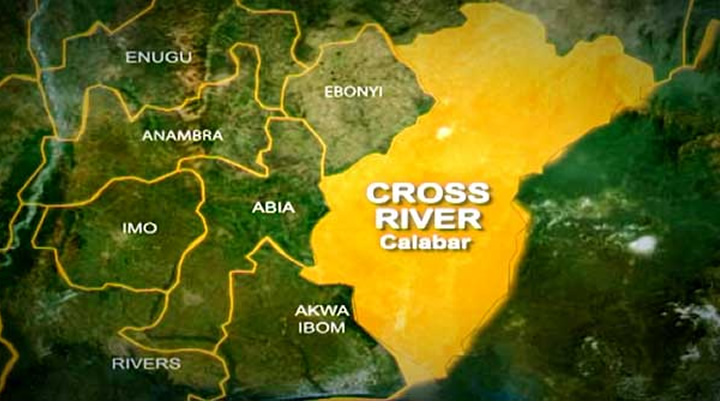
The Cross River State House of Assembly has initiated the process to amend the Local Government Law 2007, introducing provisions to expand political appointments and enhance local government administration across the state.
The bill, sponsored by Rt. Hon. Davies Etta, representing Abi State Constituency, was debated on Tuesday in Calabar.
It proposes increasing the number of appointees in each Local Government Area (LGA) to 50. Among the new roles are 16 Special Adviser positions and a cadre of officials known as Ward Relation Officers.
According to the bill, “The Chairman of Council may appoint such a number of Special Advisers to assist him in the discharge of his duties, provided that appointments, when added to other statutory appointments, shall not exceed a total number of 50.”
The proposed Ward Relation Officers will hold ranks equivalent to Special Advisers and will report directly to the Chairmen of their respective LGAs.
This move, the Assembly says, is aimed at fostering grassroots engagement and improving governance at the local level.
Another key provision of the bill seeks to elevate the office of the Head of Local Government Administration (HOLGA) to the status of a Permanent Secretary within the state public service.
The amendment stipulates that HOLGAs will enjoy all the rights, privileges, and entitlements of Permanent Secretaries, including pensions.
“The office of the HOLGA shall be equivalent to the office of a Permanent Secretary of the State Public Service and shall enjoy all rights and privileges of the Permanent Secretary, including pensions,” the bill states.
It also specifies that appointments to the HOLGA position must be made exclusively from within the local government service in the state.
The bill, which has passed its first and second readings, has been referred to a joint committee on Local Government Affairs, Judiciary, and Public Accounts for further review and consultations with stakeholders.
Speaker of the Assembly, Rt. Hon. Elvert Ayambem, underscored the importance of the proposed amendment, noting that it would strengthen local government administration and improve service delivery to the grassroots.
The Assembly is expected to hold further deliberations before making a final decision on the proposed amendments.
Politics
Trump Completes Return To White House, As 47th US President

Donald Trump has completed his return to the White House with his inauguration as the 47th President of the United States (POTUS).
Trump’s historic return, on account of adverse weather conditions, happened with a remarkable ceremony at the Capitol Rotunda, on Monday.
In his inaugural address, President Trump outlined a bold agenda for his administration, touching on issues of gender, race, border control, economic reforms, and energy policies.
ALSO READ: CSR: Dangote Awards Scholarships To 473 Students
President Trump asserted that his administration would recognise only two genders — male and female — effectively dismissing identities such as transgender, non-binary, and genderqueer.
President Trump asserted, “This week, I will end the government policy of engineering race and gender into every aspect of public and private life. Henceforth, it will be the official policy of the United States government that there are only two genders: male and female.”
He unveiled plans to overhaul the trade system, introducing an “External Revenue Service” to collect tariffs from foreign countries, promising to shift the economic burden away from U.S. taxpayers.
“I will immediately begin the overhaul of our trade system to protect American workers and families. Instead of taxing our citizens to enrich other countries, we will tariff and tax foreign countries to enrich our citizens,” Trump stated.
The POTUS vowed to make America a “manufacturing nation” again by leveraging the country’s vast oil and gas reserves.
“America will be a manufacturing nation once again. We will use our liquid gold — oil and gas — to bring prices down, fill our reserves, and export energy worldwide. We will end the Green New Deal and revoke the electric vehicle mandate, saving our auto industry,” he said.
On border control, President Trump declared a national emergency at the southern border and announced measures to combat illegal immigration.
“All illegal entry will be halted, and we will begin the process of returning millions of criminal aliens. The Remain in Mexico policy will be reinstated, and catch-and-release practices will end. Troops will secure our borders to repel this invasion,” he announced.
He also pledged to designate cartels as foreign terrorist organizations and invoke the Alien Enemies Act of 1798 to combat criminal networks.
The POTUS announced the formation of a Department of Government Efficiency and outlined measures to tackle inflation and high costs.
He also promised an aggressive crackdown on crime, leveraging federal and state resources to eliminate gang activity.
“As commander-in-chief, I have no higher responsibility than to defend our country from threats and invasions,” President Trump added.
He recounted an assassination attempt during his campaign, framing his survival as a divine sign of his purpose to “make America great again.”
In addition, President Trump criticised America’s healthcare and education systems, promising significant reforms to address inadequacies exposed by recent natural disasters.
The event, attended by lawmakers, distinguished guests, and family members, marked the beginning of President Trump’s second term. Vice President JD Vance was also sworn in, taking the oath of office in a ceremony presided over by Supreme Court Justice Brett Kavanaugh.
It was gathered that earlier in the day, President Trump and Melania Trump met with outgoing President Joe Biden and former First Lady Jill Biden, continuing the tradition of a handover meeting between administrations.
At a pre-inauguration rally, President Trump addressed supporters, promising to pardon January 6 defendants and issuing executive orders on his first day in office.
Despite freezing temperatures, the ceremony proceeded with President Trump expressing confidence in his administration’s vision and America’s future.

